Cyclone: Difference between revisions
No edit summary |
ArxCyberwolf (talk | contribs) (Added images.) |
||
| (8 intermediate revisions by 5 users not shown) | |||
| Line 1: | Line 1: | ||
[[File: | {{Infobox siren|title=ACA Cyclone 125|image=Cyclone 125.jpg|company=<div>[[Alerting Communicators of America]]</div> | ||
The Cyclone | <div>[[American Signal Corporation]]</div>|produced=1968-2007|type=[[Omnidirectional]] [[Electromechanical]]|output=125 dB @ 100 ft|hz=60|hp=50 hp|voltage=208-230/460|current=AC 3 ph|succeeded=[[ASC Tempest]]|manual=https://drive.google.com/file/d/1E8HdM_f0yur0YmolkM132O_qxVDnCIcz/view|caption=An ACA Cyclone, located in Kiel, WI. Image by FSThunderboltfan1000.}}The '''Cyclone''' is a powerful dual tone omnidirectional siren that was produced by [[Alerting Communicators of America]] (ACA) and later [[American Signal Corporation]] after ACA's bankruptcy, and at the time of its release was the most powerful omnidirectional siren on the market, and to this day still trades blows with much newer sirens such as [[Sentry Siren]]'s [[Sentry 20V1T|20VXT]] and [[Sentry 40V2T|40V2T]], and ASC's [[ASC Tempest|T-121.]] | ||
It was the loudest omnidirectional siren ACA offered, being sold alongside their [[ACA Screamer|Screamer]] and [[ACA Banshee|Banshee]] sirens. The Cyclone, along with the [[ACA Penetrator|Penetrator-50]], would have the longest production run of any ACA-designed siren, being produced for nearly 50 years until its discontinuation in 2007. | |||
== History and design == | |||
[[File:Cyclone.jpg|left|thumb|174x174px|ACA's depiction of the Cyclone 125.]] | |||
Introduced in 1968 and redesigned in 1980, the Cyclone is a simple siren in design, with the intake being on the bottom where the siren is mounted. All Cyclones use an 8/12-port dual tone rotor and stator, with the motor being located on top. All Cyclones use the same 23⅞" rotor, which has a unique "dual-intake" design which was also used on Federal's 10/12 [[Federal Signal 500|500-SHTT]] models which maximizes airflow to both rows of ports. This design is heavy and has a lot of drag when spinning, which requires the siren to use a very powerful 50 horsepower motor. On 208 V, the Cyclone requires a whopping 900 amps to start. | |||
[[File:Cyclone Rotor.jpg|left|thumb|163x163px|The unique dual-intake rotor of a Cyclone/P-50.]] | |||
Like all of ACA's sirens, the Cyclone uses a fiberglass housing that protects the siren from corrosion, giving it exceptional longevity. The siren's rotor and stator are directional to improve sound output when the rotor is spinning the right way, but if the motor is wired backwards (reverse wired) then air will be restricted to the rotor and the siren will be much quieter, sounding muffled. To this day, the Cyclone remains the most powerful electric omnidirectional siren in terms of horsepower, and even today it outperforms almost every other omnidirectional siren in raw decibel output. | |||
Very few omnidirectional sirens are louder than the Cyclone, such as the [[Federal Electric Fedelcode|Fedelcode]] Type Mach. 10 and some of Sentry's sirens such as the [[Sentry 40V2T|40V2T]]. Unfortunately, the Cyclone is also very power-hungry (with 240 V models pulling over 100 amps at start), costly to run, and lacked any sort of DC or single-phase options. Because of this, newer sirens such as the [[ASC Tempest|T-121]] or Sentry's high powered DC options (such as the [[Sentry 7V8|7V8-B]], [[Sentry 14V|14V-B]] and [[Sentry 16V1T-B|16V1T-B]]) often end up replacing Cyclones, and even during its production run it was heavily outsold by ACA's more cost-efficient options. Many Cyclones, both 120 and 125 continue to operate to this day, and were popular as a nuclear or severe weather siren during their production run. | |||
There are two models of Cyclone: | |||
=== Cyclone 120 === | |||
[[File:Cyclone 120.jpg|thumb|160x160px|An ACA Cyclone 120, located in Carrollton, MO. Image by Andy DC.]] | |||
[[File:Cyclone 120-C.png|left|thumb|161x161px|A three-signal Cyclone 120, formerly located in New Richland, MN. Its motor was destroyed by lightning in 2019 and is now in private possession. It was replaced by an [[Eclipse|Eclipse-8]].]] | |||
The Cyclone 120 was designed by James Biersach and was unveiled in November 1968, and was advertised with a far different design than what would be used in the final product. It was depicted as an 8/12-port dual tone single rotor siren, with both rows of stators facing a downward angle, forming a triangular shape towards the bottom. This was meant to disperse the sound downwards, which would increase its effectiveness near the siren. No units were ever produced with this design, and only exists in ACA's catalogue. | |||
The Cyclone 120 would be redesigned before its release, with the top 8-port row no longer being angled downwards. The reason for this is so that the top 8-port row is able to project farther to increase the range of the siren, while the angled 12-port lower row would disperse sound more effectively near the siren. The intake design was simplified, being little more than a plus shape under the intake hole, which would also serve as the mount. This would be the base design upon its release. The intake would be later redesigned, using a taller rounded design that allowed for the siren to be optionally equipped with a solenoid-operated damper, which would allow it to output a "pulse" signal. This intake design would also be used in three-signal Banshee sirens. | |||
The siren used a 50 hp 480 V AC motor, driving the single 8/12-port rotor. The siren was able to reach 125 dB at 100 ft, making it the loudest of ACA's omnidirectional sirens and it outperformed every omnidirectional siren on the market upon its released. ACA would experiment with using a ring around the stator and a redesigned housing in an attempt to improve the performance of the siren further, but this was ultimately scrapped in favor of the Cyclone 125 redesign. The Cyclone 120 would end production in 1980, being replaced by the Cyclone 125. The Cyclone 120 is a rare sight, with few active units remaining compared to the Cyclone 125. | |||
[[File:T-128 and Cyclone 1993.jpg|left|thumb|A skirted ACA Cyclone 125 in 1993, when HÖRMANN was testing ACA's sirens to see if ACA was worth acquiring. An early ACA Tempest-128 prototype is mounted below it.]] | |||
[[File:Cyclone 125-C.png|thumb|159x159px|A three-signal ACA Cyclone 125, located in Somerset, WI. Its damper is stuck shut. Image by Warning Sirens of Minnesota.]] | |||
=== Cyclone 125 === | |||
The Cyclone 125 is the successor to the Cyclone 120, introduced in 1980. The Cyclone 125 is a refined version of the Cyclone 120, with a redesigned intake, stator, and motor cover. A lip was added to the bottom of the housing that improved sound projection, and the bottom 12-port row of stator ports were also redesigned to be flush with the 8-port row instead of sloped downwards, which made both rows of ports project sound outwards equally. The Cyclone 125 had the same decibel rating of 125 dB at 100 ft as its predecessor, however it offered superior range thanks to the changes in its design. | |||
The same year it was introduced, ACA also introduced the Penetrator-50, which was essentially a rotating Cyclone, using the rotor, motor and stator from the Cyclone 120. This was to replace the [[ACA Hurricane 130|Hurricane 130 MKII]]. Like the Cyclone 120, the Cyclone 125 was available as a three-signal model with an optional damper for pulse signals. Late into the siren's production run, ACA experimented with adding a skirt under the stator which would help project the sound outwards, though it was ultimately chosen to go without the skirt for the rest of the siren's production. | |||
The Cyclone 125 would be produced by ACA until 1994, when ACA went bankrupt. HÖRMANN bought ACA and reformed it into ASC. The Cyclone would be incorporated into the Screamer line as the SC-50, until 1998 when Dale Moeller bought back the company. The Cyclone 125 would then be renamed again to the C-125 (also referred to as the C-125-AC), and would be offered until 2007, when it was finally discontinued in favor of the [[ASC Tempest|Tempest]] series. Both the SC-50 and C-125 are identical in design and performance to the ACA-era Cyclone 125. The same year (2007), the P-50, which had been renamed the T-135AC, was also discontinued. | |||
[[Category:Sirens]][[Category:Electromechanical Sirens]][[Category:Omnidirectional Sirens]][[Category:American Signal Corporation]][[Category:Alerting Communicators of America]] | [[Category:Sirens]][[Category:Electromechanical Sirens]][[Category:Omnidirectional Sirens]][[Category:American Signal Corporation]][[Category:Alerting Communicators of America]] | ||
[[Category:Dual Toned Sirens]] | [[Category:Dual Toned Sirens]] | ||
Latest revision as of 23:49, 7 October 2024
| ACA Cyclone 125 | |
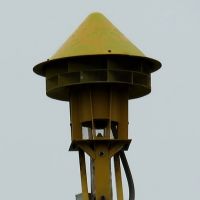 An ACA Cyclone, located in Kiel, WI. Image by FSThunderboltfan1000. | |
| Company | |
|---|---|
| Produced | 1968-2007 |
| Type | Omnidirectional Electromechanical |
| Sound output | 125 dB @ 100 ft |
| Frequency | 60 Hz |
| Horsepower | 50 hp |
| Voltage | 208-230/460 V AC 3 ph |
| Succeeded by | ASC Tempest |
| Documentation | Manual |
The Cyclone is a powerful dual tone omnidirectional siren that was produced by Alerting Communicators of America (ACA) and later American Signal Corporation after ACA's bankruptcy, and at the time of its release was the most powerful omnidirectional siren on the market, and to this day still trades blows with much newer sirens such as Sentry Siren's 20VXT and 40V2T, and ASC's T-121.
It was the loudest omnidirectional siren ACA offered, being sold alongside their Screamer and Banshee sirens. The Cyclone, along with the Penetrator-50, would have the longest production run of any ACA-designed siren, being produced for nearly 50 years until its discontinuation in 2007.
History and design
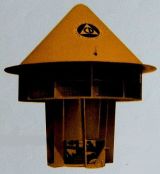
Introduced in 1968 and redesigned in 1980, the Cyclone is a simple siren in design, with the intake being on the bottom where the siren is mounted. All Cyclones use an 8/12-port dual tone rotor and stator, with the motor being located on top. All Cyclones use the same 23⅞" rotor, which has a unique "dual-intake" design which was also used on Federal's 10/12 500-SHTT models which maximizes airflow to both rows of ports. This design is heavy and has a lot of drag when spinning, which requires the siren to use a very powerful 50 horsepower motor. On 208 V, the Cyclone requires a whopping 900 amps to start.
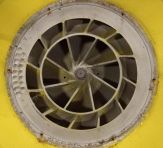
Like all of ACA's sirens, the Cyclone uses a fiberglass housing that protects the siren from corrosion, giving it exceptional longevity. The siren's rotor and stator are directional to improve sound output when the rotor is spinning the right way, but if the motor is wired backwards (reverse wired) then air will be restricted to the rotor and the siren will be much quieter, sounding muffled. To this day, the Cyclone remains the most powerful electric omnidirectional siren in terms of horsepower, and even today it outperforms almost every other omnidirectional siren in raw decibel output.
Very few omnidirectional sirens are louder than the Cyclone, such as the Fedelcode Type Mach. 10 and some of Sentry's sirens such as the 40V2T. Unfortunately, the Cyclone is also very power-hungry (with 240 V models pulling over 100 amps at start), costly to run, and lacked any sort of DC or single-phase options. Because of this, newer sirens such as the T-121 or Sentry's high powered DC options (such as the 7V8-B, 14V-B and 16V1T-B) often end up replacing Cyclones, and even during its production run it was heavily outsold by ACA's more cost-efficient options. Many Cyclones, both 120 and 125 continue to operate to this day, and were popular as a nuclear or severe weather siren during their production run.
There are two models of Cyclone:
Cyclone 120
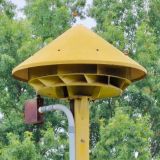
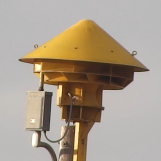
The Cyclone 120 was designed by James Biersach and was unveiled in November 1968, and was advertised with a far different design than what would be used in the final product. It was depicted as an 8/12-port dual tone single rotor siren, with both rows of stators facing a downward angle, forming a triangular shape towards the bottom. This was meant to disperse the sound downwards, which would increase its effectiveness near the siren. No units were ever produced with this design, and only exists in ACA's catalogue.
The Cyclone 120 would be redesigned before its release, with the top 8-port row no longer being angled downwards. The reason for this is so that the top 8-port row is able to project farther to increase the range of the siren, while the angled 12-port lower row would disperse sound more effectively near the siren. The intake design was simplified, being little more than a plus shape under the intake hole, which would also serve as the mount. This would be the base design upon its release. The intake would be later redesigned, using a taller rounded design that allowed for the siren to be optionally equipped with a solenoid-operated damper, which would allow it to output a "pulse" signal. This intake design would also be used in three-signal Banshee sirens.
The siren used a 50 hp 480 V AC motor, driving the single 8/12-port rotor. The siren was able to reach 125 dB at 100 ft, making it the loudest of ACA's omnidirectional sirens and it outperformed every omnidirectional siren on the market upon its released. ACA would experiment with using a ring around the stator and a redesigned housing in an attempt to improve the performance of the siren further, but this was ultimately scrapped in favor of the Cyclone 125 redesign. The Cyclone 120 would end production in 1980, being replaced by the Cyclone 125. The Cyclone 120 is a rare sight, with few active units remaining compared to the Cyclone 125.
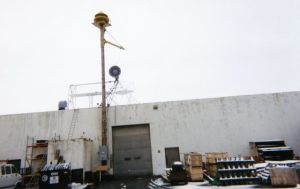
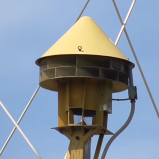
Cyclone 125
The Cyclone 125 is the successor to the Cyclone 120, introduced in 1980. The Cyclone 125 is a refined version of the Cyclone 120, with a redesigned intake, stator, and motor cover. A lip was added to the bottom of the housing that improved sound projection, and the bottom 12-port row of stator ports were also redesigned to be flush with the 8-port row instead of sloped downwards, which made both rows of ports project sound outwards equally. The Cyclone 125 had the same decibel rating of 125 dB at 100 ft as its predecessor, however it offered superior range thanks to the changes in its design.
The same year it was introduced, ACA also introduced the Penetrator-50, which was essentially a rotating Cyclone, using the rotor, motor and stator from the Cyclone 120. This was to replace the Hurricane 130 MKII. Like the Cyclone 120, the Cyclone 125 was available as a three-signal model with an optional damper for pulse signals. Late into the siren's production run, ACA experimented with adding a skirt under the stator which would help project the sound outwards, though it was ultimately chosen to go without the skirt for the rest of the siren's production.
The Cyclone 125 would be produced by ACA until 1994, when ACA went bankrupt. HÖRMANN bought ACA and reformed it into ASC. The Cyclone would be incorporated into the Screamer line as the SC-50, until 1998 when Dale Moeller bought back the company. The Cyclone 125 would then be renamed again to the C-125 (also referred to as the C-125-AC), and would be offered until 2007, when it was finally discontinued in favor of the Tempest series. Both the SC-50 and C-125 are identical in design and performance to the ACA-era Cyclone 125. The same year (2007), the P-50, which had been renamed the T-135AC, was also discontinued.